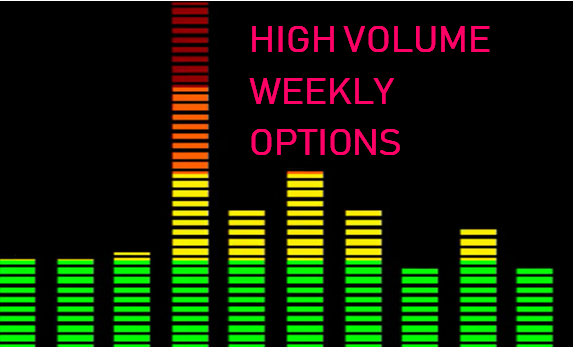
TRADER’S TRIO SPECIAL
(BETTER THAN A BAKER’S DOZEN!)
BUY THREE MONTHS OF WEEKLY OPTIONS TRADING MEMBERSHIP FOR $357 AND GET A FOURTH MONTH FREE!
Search this site:
HIGH VOLUME WEEKLY OPTIONS
by Amanda Harvey
High volume weekly options can be defined as weekly options that are experiencing a large amount of trading activity; in other words these options contracts are being bought and sold in sizable numbers. The volume on all options varies constantly, based on a number of factors, but there are certain options which generally tend to fall into the category of “high volume weekly options.”

CONSISTENTLY HIGH VOLUME WEEKLY OPTIONS
Any weekly options available for companies listed on the Dow can usually be classed as high volume weekly options. These include technology companies such as Microsoft, Intel, Apple and IBM, as well as companies in the healthcare sector like United Health and Merck.
The volume of options trading correlates with the volume in buying and selling the underlying stocks. As well as the obvious interest that the stock trading volume indicates, many stock traders also use weekly or monthly options as a means of hedging their positions against losses.
IMPORTANCE OF HIGH VOLUME WEEKLY OPTIONS IN TRADING
Sufficient volume is vital in trading any options, and especially weekly options with their short duration to expiration. If there is not enough trading volume, then a trader will likely be unable to sell their option contract for the price they want within their time-frame, regardless of the value of the contract. For this reason, it is important to consider the typical volume of an option when choosing weekly options to trade.
While high volume is important in trading weekly options, it is also detrimental overall when volume becomes too high as a result of situations like the GameStop story of early 2021. A massive increase in volume pushes prices too high, and leads to overvaluation which will generally result in many traders losing a lot of money when the price eventually experiences a correction.
CONNECTION BETWEEN VOLUME AND VOLATILITY
An increase in implied volatility (IV), which is the expected amount of future price fluctuation, also typically creates an increase in volume. In relationship to trading weekly options, an increased IV means that there is a greater chance that the price will move significantly enough during the life of the option to achieve a desirable profit.
It is equally apparent that an increase in volume also leads to an increase in implied volatility as the amount of trading causes fluctuations to the price of the stock.
FACTORS THAT AFFECT OPTIONS VOLUME
Even with options that are typically high volume weekly options, there are many circumstances that influence the volume at a given time.
1. The length of time before expiration. As an option contract nears its expiration date, it may experience either an increase or decrease in volume, and this is also linked to other influencing factors.
2. Insider selling can greatly affect the volume of trading.
3. Hedge funds buying in or selling.
4. A new product being launched.
5. Earnings report imminent or having been given.
6. Economic news.
7. Inflation.
8. World events.
9. Upgrades or downgrades given by recognized analysts have a big impact on volume.
10. Comments from a key person such as Elon Musk in relation to Tesla or BitCoin can send volume skyrocketing.
A FINAL WORD ON HIGH VOLUME WEEKLY OPTIONS
When you decide which weekly options to trade, make sure that you choose options that meet at least one of two criteria; usually trade at a high volume, or provide strong reasons that they will experience high volume within the life of the option contract.
Recent Articles
-
Weekly Option Trade Results
The results from recent trades offered through our membership service are listed on this page. -
Amazon Weekly Option Trade Delivers 318% Gain as Analysts Turn Bullish
Amazon.com, Inc. (NASDAQ: AMZN): Weekly Options Trade Delivers 318% Gain as Analysts Turn Even More Bullish -
Affirm Options Trade Soars 103% in 3 Days as Analysts Turn Bullish
Affirm stock surged after strong earnings, with a Weekly Options USA trade gaining 103% in 3 days as analysts raised price targets.
Back to Weekly Options USA Home Page from High Volume Weekly Options



